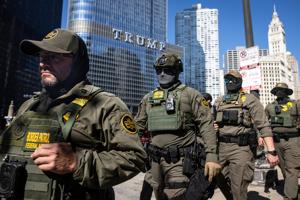
News
October 04, 2025
Apple removes apps that allow anonymous reporting of ICE agent sightings
Apple has taken down an app that uses crowdsourcing to flag sightings of U.S. immigration agents after coming under pressure from the Trump administration.
**Apple Removes Crowd-Sourced ICE Tracking App Amidst Government Pressure**
In a move sparking debate about free speech and government influence, Apple has removed an app that allowed users to anonymously report sightings of U.S. Immigration and Customs Enforcement (ICE) agents. The decision comes after mounting pressure from the Trump administration, which raised concerns about the app's potential to endanger law enforcement officers.
The app, which relied on crowdsourcing, allowed users to mark locations where they spotted ICE agents, essentially creating a real-time map of immigration enforcement activity. Supporters of the app argued that it served as a crucial tool for communities, particularly immigrant communities, to stay informed and protect themselves from potential encounters with ICE. They maintained that the app promoted transparency and accountability in immigration enforcement.
However, critics, including officials within the Trump administration, argued that the app posed a significant risk to the safety of ICE agents. They claimed that publicizing the locations of agents could make them targets for harassment or violence, and could impede their ability to carry out their duties effectively. These concerns centered on the potential for the app to be used to obstruct justice or to intimidate law enforcement personnel.
Apple's decision to remove the app has ignited a fierce debate about the balance between public safety, freedom of speech, and the role of technology companies in policing online content. Civil liberties advocates have expressed concern that Apple's action sets a dangerous precedent, suggesting that the government can pressure tech companies to censor information deemed unfavorable. They argue that the app, while controversial, was a legitimate form of expression and a valuable resource for vulnerable communities.
Conversely, supporters of Apple's decision argue that the company acted responsibly in prioritizing the safety of law enforcement agents. They contend that the potential risks associated with the app outweighed its potential benefits, and that Apple was justified in removing it from its app store.
The removal of the app highlights the growing tension between technology companies and governments over issues of censorship, privacy, and the regulation of online content. It also underscores the increasingly complex role of technology in shaping the public discourse surrounding immigration enforcement and other sensitive political issues. The controversy surrounding the app is likely to continue, raising important questions about the limits of free speech and the responsibility of tech companies to protect both public safety and the right to information.
In a move sparking debate about free speech and government influence, Apple has removed an app that allowed users to anonymously report sightings of U.S. Immigration and Customs Enforcement (ICE) agents. The decision comes after mounting pressure from the Trump administration, which raised concerns about the app's potential to endanger law enforcement officers.
The app, which relied on crowdsourcing, allowed users to mark locations where they spotted ICE agents, essentially creating a real-time map of immigration enforcement activity. Supporters of the app argued that it served as a crucial tool for communities, particularly immigrant communities, to stay informed and protect themselves from potential encounters with ICE. They maintained that the app promoted transparency and accountability in immigration enforcement.
However, critics, including officials within the Trump administration, argued that the app posed a significant risk to the safety of ICE agents. They claimed that publicizing the locations of agents could make them targets for harassment or violence, and could impede their ability to carry out their duties effectively. These concerns centered on the potential for the app to be used to obstruct justice or to intimidate law enforcement personnel.
Apple's decision to remove the app has ignited a fierce debate about the balance between public safety, freedom of speech, and the role of technology companies in policing online content. Civil liberties advocates have expressed concern that Apple's action sets a dangerous precedent, suggesting that the government can pressure tech companies to censor information deemed unfavorable. They argue that the app, while controversial, was a legitimate form of expression and a valuable resource for vulnerable communities.
Conversely, supporters of Apple's decision argue that the company acted responsibly in prioritizing the safety of law enforcement agents. They contend that the potential risks associated with the app outweighed its potential benefits, and that Apple was justified in removing it from its app store.
The removal of the app highlights the growing tension between technology companies and governments over issues of censorship, privacy, and the regulation of online content. It also underscores the increasingly complex role of technology in shaping the public discourse surrounding immigration enforcement and other sensitive political issues. The controversy surrounding the app is likely to continue, raising important questions about the limits of free speech and the responsibility of tech companies to protect both public safety and the right to information.
Category:
Politics